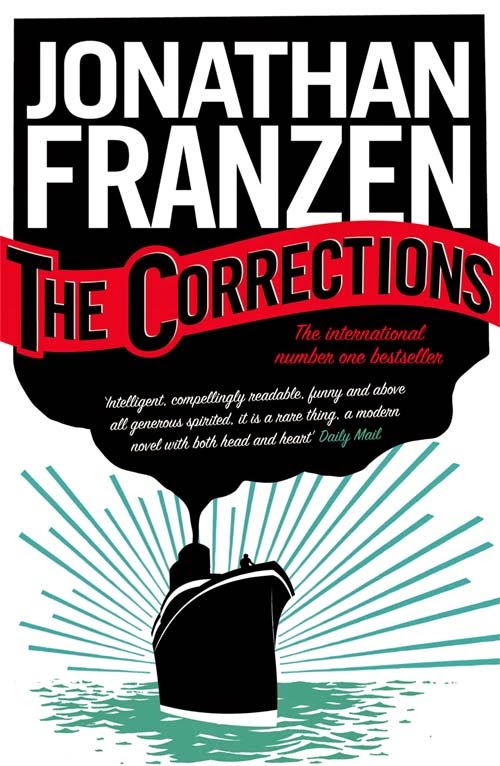Unless you consider that there is not a single black person in the whole novel. (An Asian woman pops in, but doesn't speak and I think is referred to as 'that Asian woman' at the end, and some Eastern Europeans beat each other.)
Ok, I'm being glib again (the pitfall of many a writer who reviews rather than writes). The book is too long to only be about one man dying. Initially, the novel tricks us into believing it is about the family: one daughter, two sons and his wife. Each has a chapter dedicated their lives and how they became so dysfunctional. Dysfunctional? Dissatisfied. Dysfunctional and dissatisfied.
We have the poor former academic and screenwriter who tends to just not be around, the wealthy social-climber whose wife and children are ganging up on him to convince him he is depressed and paranoid, the successful and morally liberal chef with a string of affairs behind her. Uplifting slices of Americana. That said, each chapter felt too short, as if I had come close to understanding the source of their dysfunctions but not quite. Apart from making stupid choices and being in destructive relationships.
Speaking of destructive...! Enid, the dying man's wife, is three like symbols in a casino at two in the morning. There is a tussle between bully and victim in every relationship in the novel, with many people being both. Enid casts herself as the latter, to justify her constant nit-picking and earsplitting squeals of excitement (almost audible, especially if you have a Kindle) and guilt-inducements. I think we are meant to concur, overall, but I got stuck on the splitting of my ears.
Glibness, again! But every novelist knows (and I speak from no experience) that when you claim to slice up a small-town suburb and trace these households to their now-scattered children, you set yourself up for flak. For this to work, your characters have to be relatable and dysfunctional. But only a specific segment of your audience will relate. Unless you're David Mitchell or William Faulkner.
To poke a pin in my own balloon (I hate the sound of bursting balloons as much as I hate champagne corks popping, so I'm going to ask you to do this for me), I enjoyed the story of the disgraced academic, even when it got really dire, and felt like the second half of his story could have been a standalone, satirical novel (set in Lithuania, it chronicles the naive paternalism of the West and the corresponding downfall of wealth and social stability in the country, where stability is corruption in all forms - what a blurb!). I briefly felt empathy for the other two children, but then they said something.
Are you bored yet? A long novel should not feel long. Its redeeming qualities should not just be extended themes and social critique. (Which is bad news for all aspiring novelists, but better we all know now.) It should grab you by the collar for long enough for its themes and critiques to settle in an unused fold of your brain. My favourite novels have been those about which I learnt more by writing about them and emptying out my brain's folds.
Since I am dishing out writerly advice:
- Dystopia is all the rage now. He could have cast Chip (the academic) as the wisecracking pilot, Gary (the social-climber) as the stoic captain, his wife as the dissident in the team, Denise (the chef) as a woman soldier with something to prove, Enid as the squealing civilian they pick up and Alfred (the dying man) as the dying man. Like Will Smith in After Earth but less... coherent. If you stick in some visible threat to freedom, like slobbery aliens that have arrived on the planet on a fragile pretence, you have a novel!
- Post-modernism dictates that our writing (we) discusses itself (our writing) and posts signs to remind you it knows it is an illusion but cast said sign in doubt because an illusion cannot know. Divide the novel into biographies that refer to the others and thereby... ok, I'm still bored.
- Turn the novel into a screenplay! Production houses love this kind of family-haunted-by-its-own-dysfunctions things. They can cast Jennifer Aniston as Denise and shoot long scenes where nothing happens and instead we listen to the birds and planes and bees and children playing. The novel effectively ends with the most depressing of Christmases - which is film gold.
I'm torn between the first and second, so no doubt, Mr Franzen, you are too. I'm glad to hear you regret the Alfred-lax-bowel plot device and I now regret my glibness. I look forward to the movie, because I don't think your agent will go for the Margaret Atwood angle, although if you ever change your mind...
This is the most fun I have had in my relationship with The Corrections. I may read Freedom (his latest novel) just to have an imaginary paternalistic conversation with the author. Maybe that novel is Chip's satirical account of the relationship between America and Eastern Europe. Maybe it will feature racial diversity, maybe a laser gun, maybe even Typhoid Fever. Or maybe it will be a slice of American life, because clearly this is at the heart of all philosophical discussions. Clearly.


No comments:
Post a Comment